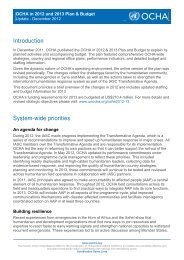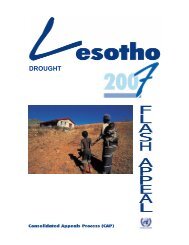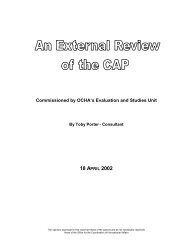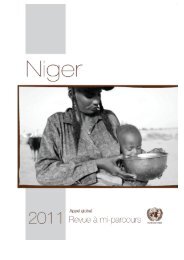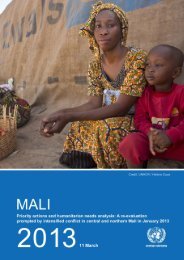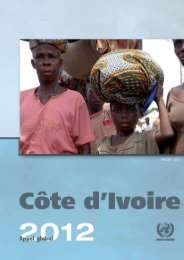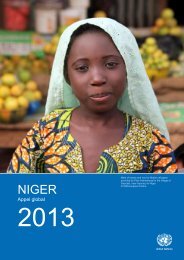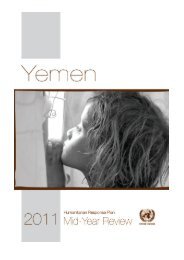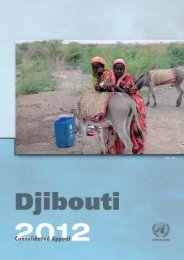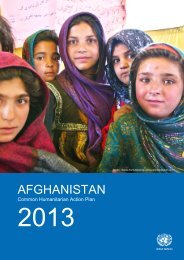SUDAN
Sudan: UN and Partners Work Plan 2012 - ReliefWeb
Sudan: UN and Partners Work Plan 2012 - ReliefWeb
- No tags were found...
Create successful ePaper yourself
Turn your PDF publications into a flip-book with our unique Google optimized e-Paper software.
United Nations and Partners[3] Humanitarian ACTION plan<strong>SUDAN</strong> WORK PLAN 201239WORST CASE SCENARIO●●●|●Dialogue over of conflict stalls and conflict expands tonew areas causing large-scale displacements.In a worst case scenario, military options are sought ratherthan political accommodation in Darfur and the three ProtocolAreas. This results in conflict that involves forces from bothSouth Sudan and Sudan, escalating hostilities in the borderareas. The lack of resolution to issues related to the CPA alsoaffects revenues from oil production, further worsening theeconomic situation. An escalation of fighting in these areascould also combine with a resurgence of intensified conflictin Darfur between groups that support and disapprove of theDoha peace agreement. The ensuing conflict spills over intointer-tribal fighting that is further exacerbated by competitionover scarce natural resources. Concurrently, conflicts may alsodevelop between agriculturalists and pastoralists.Insecurity prevents farmers from growing and harvesting crops,as well as accessing markets to sell their produce. Pastoralistsare similarly affected, as they are unable to access grazing landin areas that they have traditionally been using in South Sudan.The reduction in food production combined with deterioratingeconomic conditions drives food price inflation and leavesmany people food-insecure and vulnerable. Rising food pricesalso leads to popular discontent and results in protest and rioting,further adding to insecurity.Humanitarian needs expand rapidly and spread to newareas and, at the same time, the humanitarian community’sability to respond is compromised.Economic, political and social factors will converge to drivea humanitarian emergency. A fall in the financial resourcesavailable to humanitarian actors due to global economicconditions will be juxtaposed against increased humanitarianneeds caused by conflict, resulting in displacement,disruption of livelihoods, disruption in food production andincreased vulnerability. If climatic conditions similarly affectharvests, food insecurity will rapidly increase. With deterioratingeconomic conditions, this will be compounded by rapidprice inflation of food, fuel and household items leaving largenumbers of people - in particular children and elderly men andwomen - extremely vulnerable.With increased insecurity, humanitarian access will becomean even bigger problem. In the three Protocol Areas accessrestrictions remain in place and only limited humanitarianassistance is possible through national partners. Similarly inDarfur, a deteriorating security environment leads to a rapidlyshrinking area that can be accessed for humanitarian assistance.Further displacement in Darfur will negate any gainsthat have been achieved in terms of durable solutions and willplace additional stress on already overcrowded IDP camps.BEST-CASE SCENARIO●|●●●Conflicts in the three Protocol Areas and Darfur areresolved with lasting agreements, including the resolutionof outstanding CPA issues.Sudan is characterized by political openings in both the threeProtocol Areas and Darfur, as well as the opening a broaderdialogue on issues relating to the humanitarian agenda. In thisscenario political solutions are found to the conflict in Darfurinvolving all stakeholders for a solid and lasting peace agreement.Likewise, with regards to the border regions, politicalsolutions are found with the Government of South Sudan - andparties on the ground - that will resolve all the outstandingissues related to the Comprehensive Peace Agreement. As aresult, unimpeded humanitarian access will exist in all areasthat have been contested through armed conflict.The peace agreements are also complemented by reconciliationand mediation arrangements, reducing inter-tribal tensionsand allowing for greater access in the rural areas of Darfur. Thisscenario also includes a softening of the stance on the status ofpeople of South Sudanese origins in the Sudan, enabling thosewho want to stay to remain in the country. At the same time,an improvement in the relationship between South Sudan andSudan will allow for freedom of movement and a more orderlyreturns process for those who want to return. Political progressmay also be followed by improvements in the economic situation,particularly in terms of the removal of economic sanctionsand openings for external financial support for the Government.Improvements in the humanitarian situation allows forrecovery and durable solutions.There is an improvement in all the factors that have a bearingon the humanitarian situation and, moreover, an improvementin the capacities to respond to or prevent the impact ofhumanitarian events. It also includes a reduction in all thosefactors that might impede a humanitarian response. In thisscenario security significantly improves allowing for acceleratedreturns in all areas, including the three Protocol Areas andDarfur. Combined with an improvement in the political environment,this will facilitate humanitarian access in rural areasand an increase in the provision of basic services.There will be a marked shift will take place towards durablesolutions and away from emergency humanitarian assistance.This will entail close collaboration with the Government toensure the restoration of livelihoods and the provision of basicsocial services across all areas affected by conflict. In turn,improved livelihoods and secure access to agricultural landand markets, will greatly improve food security and the resilienceof local populations.With improved economic conditions in Sudan as well as an endto conflict and a resultant peace dividend, the Governmenthas the opportunity to reallocate and reinvest Governmentresources in basic social infrastructure and play a key part inthe advancement of durable solutions. With a shift in focus andbetter resourced Government services, humanitarian partnerswill assist the Government in developing disaster risk reductionstrategies, including disaster management plans and policies.




